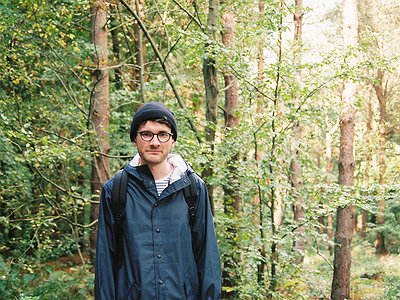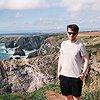Part 2
Could you describe your creative process on the basis of a piece or album that's particularly dear to you, please? Where did the ideas come from, how were they transformed in your mind, what did you start with and how do you refine these beginnings into the finished work of art?
I’ve recently finished a piece titled Longshore Drift which should be out later this year. I’m pleased with how it sounds, and it’s a new approach for me in terms of composition. Every aspect of the piece - duration, pitch, instrumentation - is based on tidal data recorded at locations along the North / East Yorkshire coast. You hear the distance between the high and low tides gradually converge and diverge over the course of one lunar cycle, compressed into about 20 minutes of music. It was quite painstaking to map out, and the end result (drone clusters, tape delay, percussion) is nothing like the sparse arrangement I had in mind to begin with.
There are many descriptions of the ideal state of mind for being creative. What is it like for you? What supports this ideal state of mind and what are distractions? Are there strategies to enter into this state more easily?
As I said, being outdoors is ideal. I like cycling and walking around Yorkshire or camping further afield (Cornwall is a favourite destination). I also get inspiration from visiting galleries and museums whenever I’m in a new city, thinking about visual or conceptual art rather than music. I think being distracted is actually a good state of mind for creativity. You need to allow yourself time to get away and reflect on ideas whilst they’re in process.
How is playing live and writing music in the studio connected? What do you achieve and draw from each experience personally? How do you see the relationship between improvisation and composition in this regard?
Correspondence is very much a home studio project. There haven’t been any live shows yet, but I do have ideas for a semi-improvised type of set using loops from existing work. My experiences of playing with Molars were quite loud and confrontational, with relatively little room for improvisation. I’m hoping to explore the opposite types of performance dynamic in future.
How do you see the relationship between the 'sound' aspects of music and the 'composition' aspects? How do you work with sound and timbre to meet certain production ideas and in which way can certain sounds already take on compositional qualities?
I think they work together closely. I try to imagine a room of musicians attempting to play each piece whilst I’m mixing. I like the idea that this music could be performed by an actual group, swapping their instruments between sections. I think I tend to avoid overly synthetic sounds and effects for that reason. At the moment, I favour organ drones and mallet percussion but I’ve written tracks for completely different sound palettes, like layers of screwdriver guitars and processed voices.
Our sense of hearing shares intriguing connections to other senses. From your experience, what are some of the most inspiring overlaps between different senses - and what do they tell us about the way our senses work? What happens to sound at its outermost borders?
Music to me, is often linked to a sense of time and place. I’ve made recordings everywhere I’ve lived over the past 12 or so years and I’ve tried to reflect a sense of the surroundings with each project. The music then shapes my own memories of inhabiting each place. I’ve been collecting more field recordings recently and have some ideas for new work related to specific local environments.
I don’t think I’ve engaged much with the outer borders of sound, but there are many inspiring musicians who follow that route. I’m into this label XKatedral at the moment - Kali Malone and Ellen Arkbro are certainly exploring those worlds.
Art can be a purpose in its own right, but it can also directly feed back into everyday life, take on a social and political role and lead to more engagement. Can you describe your approach to art and being an artist?
I wouldn’t describe myself as an artist to be honest. I don’t think I’ve earned that yet - I’m more of a hobbyist. I admire people who can find professional success through self-driven creativity, but I wouldn’t want that for myself at the moment.
I’d like to hear from people who might have found an everyday usefulness for my music, even just as background listening or for falling asleep to. The idea of music taking on a social role and finding its way into people’s homes and lives is incredibly exciting.
It is remarkable, in a way, that we have arrived in the 21st century with the basic concept of music still intact. Do you have a vision of music, an idea of what music could be beyond its current form?
I don’t think our concept of music has remained intact, really. The development of recording technologies and distribution channels have shifted our senses entirely in the past hundred or so years. We’re hugely privileged to have free access to so much obscure music right now. YouTube crate-diggers will keep on unearthing forgotten gems to feed into this constant cycle of influence and musical cross-reference.
As music-makers I think we can push ahead by publishing under open licenses and inviting others to repurpose and reinterpret our work into new, unexpected forms.






